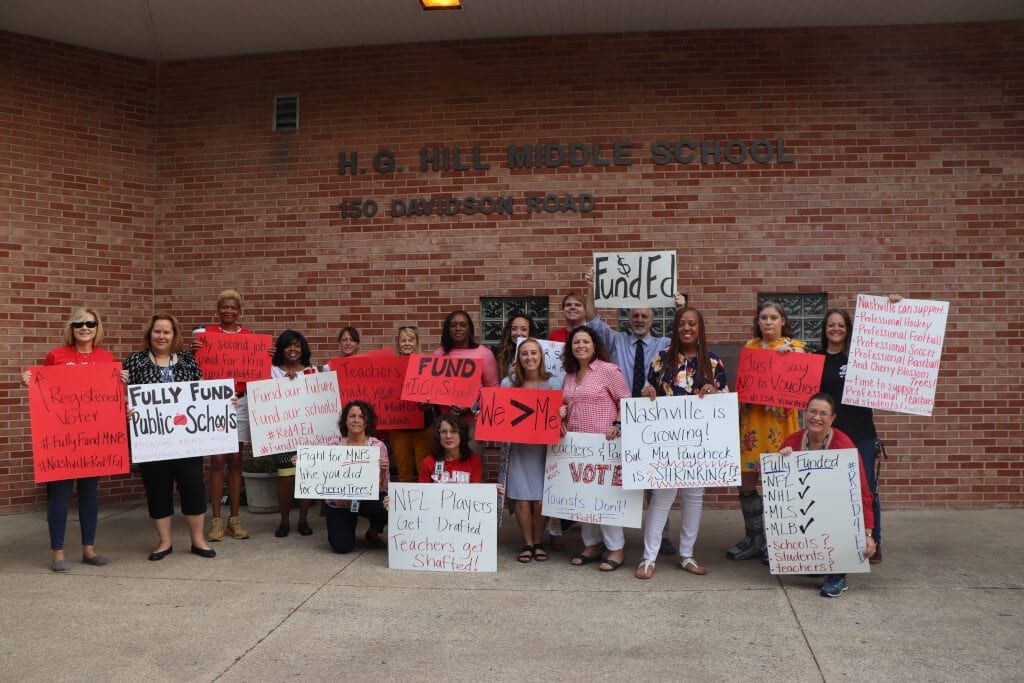NASHVILLE, TN – As they have done for months now, frustrated Metro teachers turned out in red Wednesday morning for higher pay and more school funding. They carried signs and waved to passing cars. Many parents bringing their kids to school honked their horns in support. Mayor David Briley has put a 3% cost of living adjustment (COLA) in his proposed budget for city employees, including teachers. They say COLA is not a raise.
“We want our schools to be fully funded. We haven’t been fully funded for years. This year teachers got no pay raise, no step increase, and our insurance benefits went up so we effectively had a pay decrease,” said Michele Sheriff. She teaches 6thGrade science and social studies at H.G. Hill Middle School in West Nashville.
Sheriff has taught for 26 years. Every time the step schedule gets frozen, teachers don’t get a bump in pay until it unfreezes. Erick Huth, President of the Metropolitan Nashville Education Association (MNEA), doesn’t think Metro teachers will get a step increase next year. The Metro School Board has asked for $962 million for the 2019-2020 school year. It’s not enough to give step raises next year.

“If you look in Atlanta, Georgia, Fulton County Schools are on a billion-dollar budget. To expect a school system of our size to run on less than a billion dollars is really unreasonable,” said Katherine Green, a 4thGrade teacher at Rosebank Elementary School in East Nashville.
“It’s balanced on the backs of teachers,” she said. Green’s last step increase was valued at $50,000. This year it’s valued at $48,000. “So my step actually decreased in value,” she said.
“They’re not paying us for our experience. This is my 31st year in teaching,” she said, adding “I am valued as someone who has 25 years’ experience.”
When metro schools don’t get the budget from the city they need, MNPS officials change the schedule. Green said that practice “needs to stop but it can’t stop until we fully fund our schools and the city gives the school system the money it needs.”
Huth said when MNPS thaws the step schedule they rework it adding another level at the bottom of the experience scale. So teachers like Green and Sheriff never see the money they should have gotten and are stuck at a level with teachers with less experience.
“We’re behind 17.8% of where we should be in our pay,” Sheriff said.
Since 2017, the “Wear Red for Ed” movement has spread like wildfire drawing attention to low salaries and lack of funding for public education in Oklahoma, Kentucky, Arizona, West Virginia, Colorado, North Carolina, Mississippi, Washington, Indiana, California, and Alaska.
Teachers in several states have struck for better pay and benefits and won concessions in red states, like Tennessee, where the state legislature just passed a voucher bill that will give $125 million to private schools by 2024.
Public school teachers and the MNEA, as well as school boards in Middle Tennessee, and the Tennessee Organization of School Superintendents are opposed to Governor Lee’s voucher plan. They say it will drive Tennessee public schools even further into the red and spell disaster in the long run.
Ashley Smith is a preschool teacher at Rosebank Elementary School in East Nashville. She gets up at 5 am and gets home around 4:45 pm. She spends $50 a month of her own money on supplies. In March it was for caterpillars.
“We bought butterflies for the kids and watched them grow and that cost $50 right there in March,” Smith said.
“We don’t get paid enough to do what we do and we can’t survive on what we get paid. I have to pay rent today and I’m going to have a negative balance in my account because we don’t have enough money to pay regular rent and just regular bills on top of that,” Smith said. She hasn’t had a step increase in three years.
Sheriff works 50 hours at H.G. Hill Middle School, gets paid for 40 hours, but that doesn’t count grading tests and class prep which she does at home on her own time.
“We’re here till almost 5 every day because we don’t have bus drivers to take our children home. So we dismiss at 3:15 but we have the kids here until 5,” she said. Sheriff said some students at H. G. Middle have had three or four teachers this year, some currently have no teacher, and those students are relying on substitutes to teach them.
In 2010 former Director of Schools Jesse Register reduced bus drivers’ workday from 8 to 7 hours, a 12.5% cut in pay. In addition, he eliminated five in-service training days and bonuses, cutting drivers’ wages by a total of 15 percent. The result has been a chronic shortage of Metro school bus drivers who either retired or left Metro Schools to work for other trucking companies for more money.
MNPS spokesperson Dawn Rutledge said the district has lost nineteen bus drivers this year. She said there are 372 drivers on payroll and another 31 under contract. That is 55 too few.
Sheriff spends two extra hours a day watching kids because they can’t take the bus. They wait for their parents to pick them up when they get off work. Those hours are unpaid for the teachers at Hill Middle School who should be done at 3:15 pm. Much the same thing that happened with bus drivers is happening with certified teachers in Metro Schools. They are leaving in droves because the pay is too low and the cost of living in Nashville is too high.
Rutledge said the district has 5,279 certificated teachers on payroll and 488 vacancies as of May 3, 2019. The City Council and MNPS officials will discuss next year’s school budget in council chambers May 16.
“We will be showing up at city council to support our school board who asked for a 10% raise plus a step,” said Sheriff.



